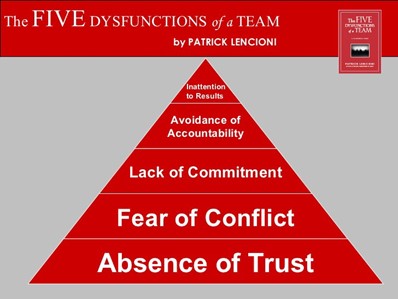
Business functions on the premise that we work better with others. A project is more likely to succeed if you bring together a diverse group of people with different talents; building a house is simpler if the bricklayer works with an electrician and plumber, rather than doing everything themselves.
If you prefer video over text, we made a short under 4 min video for you:
Collaborating – the challenge
But collaborating can be problematic – each member of a team has a different approach, different values and different perspectives – that is the value of cognitive diversity, but that means they may agree on little.
Even the word collaboration can be difficult – for many Europeans, particularly older ones, collaboration is associated with the Vichy regime in France or other Nazi-sympathizers in countries occupied during the Second World War. And collaboration does ask you to examine where your loyalties lie, what compromises you are prepared to make and to what extent you are prepared to share your own expertise and skills. In many ways, evolution has failed – human survival has depended on cooperation, but we frequently fail to work effectively with others.
If we discard the situations where people deliberately sabotage a team for their own purposes and also the teams blighted by incompetence, we need to understand why teams fail, and how we can fix them.
Dysfunctional teams
In his book, The Five Dysfunctions of a Team, Lencioni discusses the reasons he thinks teams fail:

- Absence of trust
- Fear of conflict
- Lack of commitment
- Avoidance of accountability
- Inattention to results
Interestingly, all five dysfunctions are attributable to culture. Lack of trust, damaging conflict, uncertain commitment, shirking accountability and absence of trust focus come from a lack of shared values and a communication failure. The very definition of team – a group of people working towards a shared goal – requires there to be common values and understanding within the group.
(image credit: https://medium.com/taskworld-blog/lencionis-5-dysfunctions-of-a-team-330d58b2cd81)
The culture of collaboration
The challenges start as soon as the team forms – or when there are new additions or changes within the team. Two key factors mean that a team will always struggle to start with. Firstly, culture is invisible, so we don’t recognize the miscommunications, the mismatches of expectations to culture – we take them personally and assume a level of dislike or distrust that isn’t really there.
Secondly, in order to share our values and principles, we need psychological safety; for psychological safety, we need trust, and for trust, we need shared values… We can’t uncover others’ values because we are unaware of our own as anything distinct from ‘what is normal’ and so classify everything else as abnormal. Our pre-historic flight-fight instincts are triggered, and trust is gone before it really came.
A truly inspirational leader can catch this and turn things around. But if we’re honest, truly great leaders are few and far between. In fact, in an innovative experiment, the University of Melbourne asked a group of actors to role play a bad boss talking to a team member. The actors had a great time until they were asked to role play a good boss – they really struggled, because being a good boss is much harder.
Cultural Intelligence and Collaborating
Cultural intelligence (CQ) won’t turn David Brent (or Michael Scott) into an outstanding leader. However, cultural intelligence is the foundation of bringing together diverse cultural perspectives and values into a cohesive team.
Cultural intelligence promotes key team and interpersonal skills:
- Self-awareness
- Empathy and listening
- Relationship building and trust
- Influencing
- Communication
A culturally intelligent person will recognize the impact of an individual’s cultural values and will refrain from making assumptions that re-interpret another’s actions from their own perspective. Their CQ-tuned senses will help them avoid the minefields and be prepared to create a culture of polite curiosity and learning. They will be able to create psychological safety and conscious vulnerability to uncover hidden values and cultural assumptions. Their own openness and curiosity will start building the foundation of trust that teams need so much.
CQ as a lexicon to effective team working
As trust grows and cultural intelligence is seen to be a way to discuss difference without judgement, conflict is no longer personal requiring active countermeasures. The team can see that their strength is in a controlled and regulated difference of skills and perspectives – conflict brings learning and innovation, not disunity and resentment. CQ helps us identify what is important to others giving us insight into how to gain and develop commitment – and with commitment, the fear of accountability diminishes. The culturally intelligent team has now avoided the distractions and dysfunctions Lencioni warns of and allows the team to focus on results and doing a great job.
Self-awareness
A team that acknowledges differing cultural values at the very beginning is already developing the maturity teams need to perform at the highest level. The research that shows that diverse teams are more effective and more productive overlooks the fact that that diversity dividend only pays out if the team functions as intended – a diverse team that lacks cultural intelligence is just as dysfunctional as any other dysfunctional team.
Self-awareness is that crucial first step. From there, the respect for others’ values and behaviors, understanding of the complexity of identity and power and realization of the subjective nature of normality allow mutual learning, shared respect and a platform for team growth.
Team building – CQ style!
Most teams dread team-building exercises – and rightly so! Team-building that ignores the cultural values of each individual cannot build the trust and psychological safety that a functional team needs. Team spirit can only be built when the individuals understand the motivations and brain processes that characterize individual members.
A team cannot function without effective communication. But communication cannot happen successfully when the people interacting assume that the message they think they have sent is received in exactly the same way. Language is a particularly poor tool for communication. A saying often misattributed to George Bernard Shaw sums this up quite well:
The great enemy of communication, we find, is the illusion of it. We have talked enough; but we have not listened. And by not listening we have failed to concede the immense complexity of our society–and thus the great gaps between ourselves and those with whom we seek understanding.
William H. Whyte
Our brains are very comfortable with taking a mass of complicated input and simplifying it in terms that comply with our own world-view and perspective. Cultural intelligence adds a check and balance encouraging us to try and view the same input with a different lens.
Developing culturally intelligent collaborative teams
Culturally intelligent collaboration is at the heart of inclusive and effective teams – teams which are innovative, creative and great places to work. So here are three suggestions to develop cultural intelligence and collaboration:
- Be open in discussing cultural values
Use a cultural profiling tool (such as WorldPrism) to give a vocabulary to discuss culture objectively. Knowledge is power – and even more so in talking cultural values. Learning cultural preferences and styles will bring dividends later.
- Encourage discovery, curiosity and learning as the foundation of your team culture
To paraphrase – a team that learns together, performs together! Learning about others’ perspectives gives each individual greater wisdom and greater respect for their colleagues – and the ability to leverage their own and others’ distinctiveness to raise productivity.
- Listen and ask
The advice of grandmothers around the world remains true: we have two ears and one mouth, so we should listen twice as much as we talk. A biblical proverb states a similar thought: Even fools are thought wise if they keep silent, and discerning if they hold their tongues (NIV translation of Proverbs 17:28). Silence is a great developer of cultural intelligence!
Mckinsey’s now famous research into the diversity dividend shows that investing in cultural intelligence has a business value and in a team that requires collaboration, CQ is the most essential ingredient.
We’ve got over three decades of experience supporting over 1 million people worldwide. We’re passionate about delivering change; how can we help you?
- AI,
- Blog,
- Complex Organizations,
- Cultural Intelligence,
- Cultural Intelligence (featured),
- Diversity & Inclusion,
- Global Leadership & Transformation,
- Global Leadership Development,
- Global Mobility,
- Global Team Collaboration,
- Hybrid Working,
- Influence,
- Performance and Feedback,
- Product News,
- Talent Acquisition & Onboarding,
- Team & Collaboration,

Matthew Maclachlan
Matthew MacLachlan is a seasoned expert in cultural intelligence and inclusion, currently serving as the Head of Learning Innovation at Country Navigator. With over two decades of experience, he designs innovative learning solutions to foster culturally intelligent and inclusive organizations. Matthew's career spans roles such as Learning and Development Manager at the University of Surrey, Head of Intercultural and Communication Skills at Learnlight, and Intercultural Account Manager at Farnham Castle. An advocate for practical, research-backed learning, he co-hosts the "Hippo Question Podcast" on cultural intelligence and inclusion. More posts by Matthew MaclachlanRelated articles
Ready to get started?
Kickstart your cultural intelligence journey and try our
no-obligation free trial for 14 days
Join companies already using Country Navigator


COMMENTS